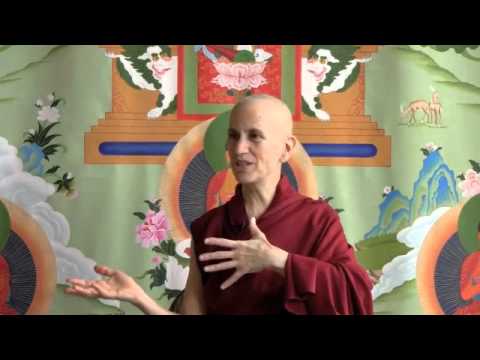Immeasurable compassion
Immeasurable compassion
This talk was given during the White Tara Winter Retreat at Sravasti Abbey.
- Compassion is very closely linked with forgiveness
- The necessity of forgiving ourselves
- Forgiveness is letting go of the anger
White Tara Retreat 13: Immeasurable compassion (download)
The second of the four immeasurables that we’re talking about, “May all sentient beings be free from suffering and its causes,” is compassion. Compassion is very closely linked with forgiveness because compassion is wanting sentient beings to be relieved from suffering and its causes. Anger is wanting them to have suffering and its causes; and forgiveness is letting go of the anger, releasing the anger. To have compassion for others, we have to be able to forgive them.
We also have to be able to forgive ourselves. Sometimes, we make mistakes in our lives and then we really get very down on ourselves and say, “I’m a failure. I’m a catastrophe. No wonder everything goes wrong, blah, blah, blah…” That kind of self-demeaning is just as unrealistic as holding a grudge against somebody else for something harmful that they did.
The fact is, whether it’s us or others, people make mistakes. We have the option of holding onto our anger for them or for ourselves, but holding onto anger only makes us miserable. When we learn to forgive ourselves for our mistakes then we can also forgive others for their mistakes. That opens the door to have a compassionate feeling towards them.
If we’re still holding a grudge, compassion is very difficult, isn’t it? “How can I want them to be free of suffering? They hurt me! I have every right to get revenge! They deserve it!” We go on our own bandwagon and that anger gives us a sense of power. It’s completely ridiculous because motivated by that anger to retaliate; we just create more negative karma and get more suffering results in this life and in a future life.
Forgiveness is simply our letting go of our anger. It doesn’t mean that what the other person did was right. It doesn’t mean it was okay. It’s simply us deciding that we’re tired of being angry because anger hurts us.
When we wish others to have compassion, we want them to be free of suffering. Everybody has different sufferings that they experience, so we want them to be free of whatever particular brand they have. Not just suffering, but also the causes of suffering. We want people and other living beings as well, to be free of ignorance, anger, and attachment. That’s the biggest thing that makes them and us create suffering—the actual causes are in our own mind. If we want sentient beings to be free of suffering and its causes we want them to be free of the greed, of the loneliness, of the paranoia, of the anxiety, of the low self-esteem, of the arrogance, of whatever it is that is defiled in their mind that motivates them to do harmful actions. If they were free from those very destructive mental states and harmful emotions, then they wouldn’t be doing destructive actions. Neither would we.
When we have compassion for ourselves, we want ourselves similarly to be free of our anger, and our greed, and our rebelliousness, and our lack of consideration for others, and so on, and so forth. In that way, also extend love: wanting ourselves and others to have happiness and its causes. We should not think that love and compassion are just for other people; that we’re worthless sentient beings who aren’t worthy of it. Because we say, “May all sentient beings have happiness and its causes and be free of suffering and its causes.” So “all” must include us.
We have to be able to make peace with ourselves; with forgiveness, with honesty, with a lack of arrogance, and with a certain kind of love and compassion for ourselves. That can also be extended to others because we and others are exactly alike: wanting happiness, not wanting suffering.
So there’s a lot to practice there, right?
Venerable Thubten Chodron
Venerable Chodron emphasizes the practical application of Buddha’s teachings in our daily lives and is especially skilled at explaining them in ways easily understood and practiced by Westerners. She is well known for her warm, humorous, and lucid teachings. She was ordained as a Buddhist nun in 1977 by Kyabje Ling Rinpoche in Dharamsala, India, and in 1986 she received bhikshuni (full) ordination in Taiwan. Read her full bio.


